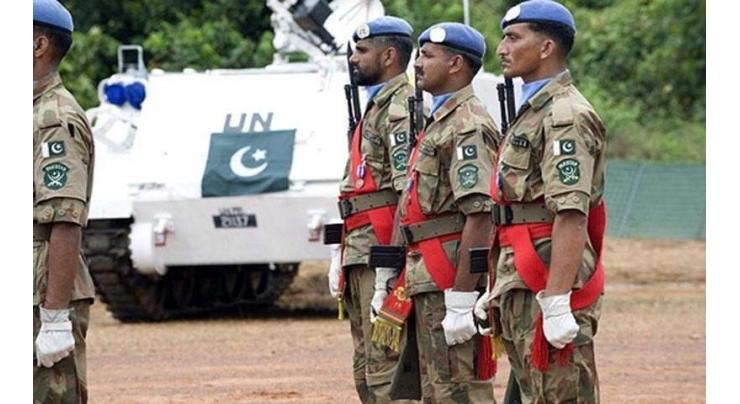
- Home
- Pakistan
- News
- Pakistan's role in performing peacekeeping missions needs to be highlighted intensively: Experts
Pakistan's Role In Performing Peacekeeping Missions Needs To Be Highlighted Intensively: Experts
Faizan Hashmi Published March 09, 2023 | 10:01 PM

The foreign policy experts on Thursday stressed the need to highlight the role of Pakistan while performing peacekeeping missions at international fora comprehensively through publishing more literature and books
ISLAMABAD, (UrduPoint / Pakistan Point News - 9th Mar, 2023 ):The foreign policy experts on Thursday stressed the need to highlight the role of Pakistan while performing peacekeeping missions at international fora comprehensively through publishing more literature and books.
The experts made the remarks during the launching ceremony of the book "International Peacekeeping: Perspectives from Pakistan" edited by Dr. Tughral Yamin and recently published by the Institute of Policy Studies (IPS).
The ceremony, organized by IPS in coordination with the Centre for International Peace & Stability (CIPS), National University of Sciences & Technology (NUST), and Centre for Critical Peace Studies, University of Management and Technology (UMT), was chaired by Ambassador (Retd) Khalid Mahmood, Chairman of Institute of Strategic Studies, Islamabad (ISSI).
Senator Mushahid Hussain was of the view that Pakistan had been at the forefront of peacekeeping missions but never received due recognition and reward at the UN and international level.
"Pakistani peacekeepers are the best ambassadors of Pakistan," he voiced the words attributed to the first Indonesian President Sukarno.
He said that the book, which was launched today, rightly served the cause by focusing on this aspect( Pakistan's role in peacekeeping missions).
"The UN has remained selective and not attentive to human rights violations in Palestine, Kashmir, Gaza, and other Muslim-majority conflict areas," he lamented.
Chairman IPS Ambassador (Retd) Khalid maintained that the role of UN peacekeepers and the concept of peacekeeping evolved with the change in the nature of war, and added that in addition to separating the combatants, now peacekeepers had to resolve the internal conflicts and perform disarmament.
Pakistani peacekeepers had executed the said mission which had evolved into a more complex role over the years, he concluded.
Associate Professor School of Politics and International Relations, Quaid-i-Azam University Dr. Farhan Hanif Siddique noted that the book was an interesting contribution as it goes beyond the militarized view of peacekeeping and the evolved socio-economic culture taking birth in the respective counties due to the peacekeeping mission, besides the power politics.
He further underscored the importance for scholars and practitioners to understand the history, evolution, and mechanics of peacekeeping and peacebuilding.
Related Topics
Recent Stories

Delegation of international investors meets Finance Minister

Federal Govt stands with Balochistan for its development: Naqvi

UAE President receives condolences of Prime Minister of Pakistan over passing of ..

ECC approves to enhance wheat procurement targets

UN urges Israel to 'stop escalation' as tanks enter Gaza's Rafah city

EU stumps up $125 mn for Yemen after aid groups' plea

Governor Tessori condemns May 9 riots, calls it a 'pre-planned conspiracy'

PM condoles with UAE President over Sheikh Tahnoun’s death

Milan nets Giro 4th stage, Pogacar retains lead

UBS back in profit after Credit Suisse takeover losses

Asiya Gul lauds Shafaat's services as DG LG

President for dialogue with all political forces in Balochistan
More Stories From Pakistan
-
May 9 vandalism against state of Pakistan: Muqam
1 hour ago -

Federal Govt stands with Balochistan for its development: Naqvi
1 hour ago -

Governor Tessori condemns May 9 riots, calls it a 'pre-planned conspiracy'
1 hour ago -

PM condoles with UAE President over Sheikh Tahnoun’s death
1 hour ago -

Asiya Gul lauds Shafaat's services as DG LG
1 hour ago -

President for dialogue with all political forces in Balochistan
3 hours ago
-

Supreme Court adjourns IHC judges letter case
3 hours ago -

RDMC, Hunar Foundation Vocational Training Center inaugurated in Nokkundi
3 hours ago -

Man critically injured as vehicle catches fire amid CNG filling
3 hours ago -

Provincial health ministers chair meeting of Punjab Blood Transfusion Authority
3 hours ago -

Sheikh Jafar Khan Mandukhel assumes charge as Governor Balochistan
3 hours ago -

PITHM organizes counselling session
3 hours ago










